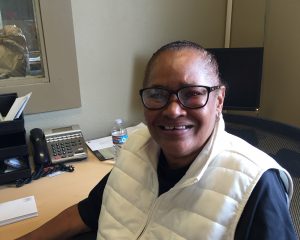
People with drug felonies can now apply for food stamps in Alaska. With the signing of Senate Bill 91, the state’s criminal justice reform bill, the state partially opted-out of the 1996 federally-imposed lifetime ban. Individuals can now apply, but they have to prove that they are complying with parole and substance abuse treatment requirements.
Sixty-one year-old Ivory Mack committed a drug felony nearly 20 years ago. These days, she is working at Bean’s Cafe, a soup kitchen in downtown Anchorage. Standing in a small office, she handed out vitamins and socks through a half-open door.
“Your uncle?” she asked one of the clients as he looked through a box of socks. “What about your uncle? He need a pair, too? Well, take two pair.”
She used to be on the other side of that door. Mack said she spent about six years hanging out at Bean’s and the Brother Francis Shelter when she was fighting a nearly four-decade-long drug addiction.
“Started as a kid taking Speed,” she said. “No one wants to be fat, you know. So I was on that. Body image. I was anorexic, I went through it all.”
Eventually she started using harder drugs because she wanted to fit in, “Everyone was doing it.”
Then, about 20 years ago, “police busted me for having drugs on me. I went to jail, did my little time, came out, and I couldn’t eat because they wouldn’t give me food stamps because I was a drug-related felon.”
She said she was homeless, vulnerable, and didn’t have anywhere to turn. And she was angry.
“You know, people can go kill people, rape kids — and eat. Have a few drugs on you, you have to go hungry? It’s ridiculous.”
The ban was part of President Bill Clinton’s War on Drugs and quickly passed Congress. Anyone convicted of a state or federal drug felony after August 22, 1996 would have a lifetime ban on receiving food stamps, now called the Supplemental Nutrition Assistance Program, or SNAP. States could opt out of the ban and most already have.
Now, that ban has been partially lifted in Alaska. People with drug felonies can apply for the program, but they have to prove that they are complying with parole requirements and substance abuse treatment plans.
That’s sometimes easier said than done, said Cara Durr with the Food Bank of Alaska. “You know if this is something that’s happened 10 or 15 years ago, it’s not going to be as easy as someone who has just been released.” It’s also harder for people who have felonies out of state.
Durr said the Food Bank will work with people to help them provide the necessary proof because food assistance can help them become more stable and reduce recidivism.
“People who are coming out of incarceration are often some of the most vulnerable people,” she said. “They’re just trying to get back on their feet. And if we’re withholding food assistance from them, it’s not helping them to really do that.”
It’s unclear how many people in Alaska will be affected by the change in the law because people come and go from the state, but nearly 175 people with state and federal drug felonies have been released from prison in Alaska so far this year and can now apply.
According to the Marshall Project, only four states still have complete bans in place: Mississippi, South Carolina, West Virginia and Wyoming. Georgia partially lifted the ban there earlier this year.
For Ivory Mack, it was too late for the change to help her. She said she would only receive about $20 a month and with adverse health conditions, it would be hard for her to get to the public assistance office and complete the interview to apply. So she is getting by on her modest income and a couple of meals from Bean’s while she’s down there working.
It feels good to be giving back to the place that helped her make it through, Mack said. “I like it because I get to see people, and I feel like I’m a good example to them. If I can do it, anyone can do it.”
Mack said she’s been clean for three years now, and she’s hoping access to food stamps can help some of her friends get clean, too.
Anne Hillman is the healthy communities editor at Alaska Public Media and a host of Hometown, Alaska. Reach her atahillman@alaskapublic.org. Read more about Annehere.





